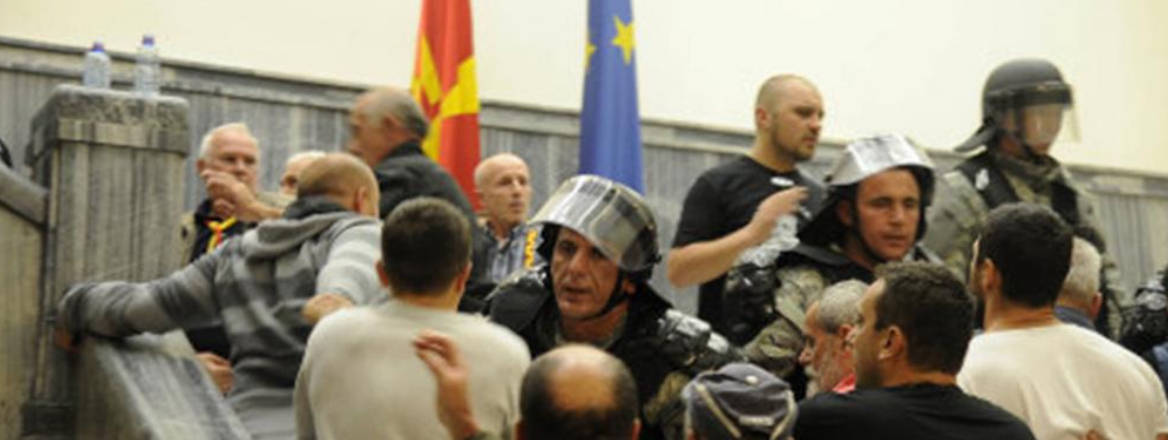Is Russia Trying to Fuel Anti-American and Anti-European Tensions in Macedonia?
The Former Yugoslav Republic of Macedonia has descended into political violence, with the US and the EU trying to calm the situation while Russia accuses them of 'gross interference'.
After protesters stormed the Former Yugoslav Republic of Macedonia’s (FYROM) parliament last Thursday to attack opposition lawmakers, the US and the EU were quick to condemn the violence.
On its website, the US Embassy in the capital Skopje said that the aggression was ‘not consistent with democracy and is not an acceptable way to resolve differences.
‘It is critical all parties respect democratic processes and the law, and refrain from violent actions which exacerbate the situation’, the US Embassy cautioned.
However, what may appear standard-procedure criticism could easily fuel allegations made by Russia that the US and the EU are to be blamed for the political clashes in FYROM.
On Friday, Moscow accused the West of ‘gross interference’ in FYROM’s politics and of a purported manipulation of ‘the will of the citizens with the aim of removing the legitimate government from power’.
Despite Russia’s recent accusations, there is no evidence to suggest that FYROM’s political turmoil plays into the hands of the US or the EU or was incited by either.
Instead, the allegations could primarily be attempts to influence the debate in Moscow’s favour. In Brussels and Washington, there are growing concerns over the Russian government’s strategy to position itself as an alternative to the EU in the region and to back allies who have advocated for a friendlier approach towards the Kremlin.
However, in countries such as FYROM, the Kremlin’s outreach is more welcome than ever among parts of the population.
In 2015, the EU attempted to resolve a long-running political deadlock by negotiating a US-backed deal with FYROM’s political parties. This included snap elections under the condition that controversial Prime Minister Nikola Gruevski would resign prior to the vote.
Gruevski, also the leader of the conservative VMRO-DPMNE party, had faced allegations of having orchestrated a large-scale wiretapping operation in which thousands of people were purportedly monitored.
His subsequent resignation was seen as a sign that Macedonia might be ready to move on politically.
Despite initial signs of progress, the EU’s attempt to bridge the widening political divide between the opposition and the government largely failed.
Opposition parties gained votes in last December’s elections, but the country’s president – a VMRO-DPMNE member – has so far blocked efforts by Albanian parties and the Social Democrats to form a coalition, leaving the country without a functioning government.
Liberal people in the Balkan state, in particular, consider the president’s actions a desperate attempt by the previous government to hold on to power. Conservatives on the other hand believe that the US and the EU are supporting the Social Democrats and Albanian parties to topple the VMRO-DPMNE.
The US and the EU have inadvertently found themselves caught between a rock and a hard place.
As the largest American representation in any Balkan state, the US Embassy in Skopje has tried to stay out of the domestic debate as much as possible.
After a conservative newspaper claimed last year that the embassy supported Gruevski in the upcoming snap elections, the US openly dismissed the allegation to stop speculations.
The EU’s stance has been observed with even more scrutiny in Skopje, given its mediator role in the 2015 negotiations and FYROM’s candidacy for EU accession which started over a decade ago.
Although the political turmoil was initially mostly seen as an indication that the country’s road to EU membership might become rockier than expected, there are now mounting fears that much more may be at stake in the state of about 2 million.
The tensions escalated last Thursday after an ethnic Albanian was elected as parliamentary speaker for the first time in the country’s history.
Representing about 25% of the population, Albanian minority parties have tried for more than a decade to overcome an ethnic divide which nearly ended in full civil war 16 years ago.
Dozens died in clashes in which ethnic Albanian rebels were involved at the time.
Those memories are still very much alive in FYROM. Yet, so far, none of the major stakeholders has signalled much willingness to negotiate a cross-party solution.
On the contrary, Gruevski accused his political opponents of having incited the violence on Friday, saying the Social Democrats were responsible for it because of their ‘greed for power at any cost’. It is an accusation Gruevski’s opponents would also make against him.
Rick Noack writes about foreign affairs for the Washington Post and other publications from London. Originally from Germany, he began to work at The Post as an Arthur F. Burns Fellow. In 2014, he was awarded the Aitchison Public Service Fellowship in Government by Johns Hopkins University.

